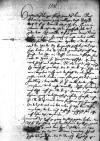Nach erbittung meiner gantz willigen dinst / schigke ich Ewer Furstlichen Gnade hiemit etlich schreiben, / szo mir ein camerer ⌊koniglicher maiestet von Polen⌋ zugeschigktstelt und geben hat. / Ich wollet Ewer Furstlichen Gnaden gerne etwas newes dabeÿ anzeigen, / szo wess ich nicht anders, / allein das gestern die herren von Merheen, / ⌊romischer koniglicher maiestet⌋ und den ⌊stenden ditz konigreichs⌋ geschriben und angezeigt haben, / das der ⌊Thurk⌋ gewaltiglich auff uns zeucht. / Hat schon ein bassa mit einem trefflichen here uber die ⌊Saw⌋ / in Simich vorangeschicht. / Sie bitten umb hulff und beistant. / Nu als mich die sache ansicht, szo vorhoffe ich entlich, / das die ⌊romische konigliche maiestet⌋ hieher nit eine vorgetane reisze mit der hulff des almechtigen gethan wirdt haben. / Man stedt, Got hab lob, in gutter handlung. / Das volk ist zu widderstandt solhem grausemen ⌊veinde⌋ nicht unwillig, / lassen sich warlich noch bisher / auff irer ⌊romischen koniglichen maiestet⌋ ermanen ansinnen und begeren / gantz underthaniglich erfinden. / Zweifel nicht in ⌊romische koniglicher maiestet⌋ werde etwas fruchtpars peÿ inen erheben, sonderlich dieweil aus im andren zu ⌊diser Kron⌋ richern eingeleipten landen / auch treffliche auschusse sein alhie auff disen tage vorsamlet. /
Ferner wil ich Ewer Furstlichen Durchlaucht gancz dinstlich gepeten haben, / wie ich zu ⌊Regenspurg⌋ auch enntlich mit derselbigen geredt, das Ewer Furstliche Gnade mit denn hern ⌊Valdesio⌋, / cui cupio plurimum per reverendissimam dominationem Vestram comendari, szo vil zu handeln gerucht, / das die ⌊romische kayserliche maiestet⌋ den jungen fursten wiehent hertzog Constantines son in solher form schribe, / nach deme sein vater, / wie sein romische kayserliche maiestet manchfaltig vorstanden, / ein trefflicher und teuer haubtman widder die veindt des heiligen crislichen glaubens gewest / und alzeit sich gegen irer romischen kayserlichen maiestet, irem liepsten ⌊bruder⌋ und dem ⌊haus Ostereich⌋ mit sonder... gutten willen erzaigt, / und er sich auch nu in die fustapf[en] seines vaters gleicher weise pegebe. / So wer irer ⌊romischen kayserlichen [maiestet]⌋ genediges ermanen und begeren an in, / er wolle in einen solhen erlichen wisen / gemeiner cristenheit, romischer kayserlicher und ⌊romischer koniglicher maiesteten⌋, auch im selbst zum besten vorharren / un[d] helffen mitsampt seiner freuntschafft, / alles das jenige bericht[en], szo iren maiesteten, / auch ⌊koniglicher maiestet von Polen⌋ / und derselbigen alle[n] konigreichen und landen, / zu gutter ainigkheit und frid / gelangen mocht. / Dorfur sal er sich peÿ irer ⌊romischen kayserlichen maiestet⌋ und iren liepsten ⌊bruder⌋ / in allen seinen sachen pey ⌊koniglicher maiestet zu Polen⌋ guter und billicher forderung / und sunst aller gnad vorsehen, / es in bona forma, / doran wirdt Ewer Furstliche Gnade dem hern ⌊Nibschitz⌋, der mir abermals der halben schreibt, ein sonderlichs wolgefallen thuen, / und was Ewer Furstliche Gnaden alszo peÿ dem hern ⌊Valdesio⌋ erhilde, das ich desselbigen ein abschrifft haben mocht, / darnach romischer koniglicher [maiestet] auch es das fuglicher schreiben mocht. / Vorsich nich, dient... dem hern ⌊Nibschiz⌋ dorinne gedint wirdt sein, Ewer Furstliche Gnade werde iren vlis nicht sparen. / Ich schigk auch Ewer Furstlichen Gnaden he......semen Tilel in diser z[eit] vor zechnet und thue mich Ewer Furstlichen Gnaden hiemit bevelhen. /


